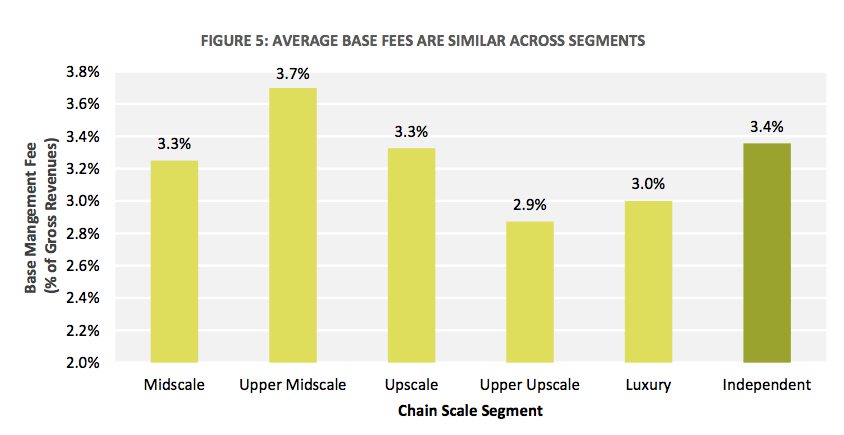Negotiating a Hotel Management Agreement can be a much longer process than you imagined. What goes into making the agreement, which looks more like a book, is going to form the business relationship that may last as long as 30 years or hamper your ability to exit a property effectively. Negotiating the best contract for both parties is important for everyone involved so that the new business relationship starts off on the right foot.
What seems like it should be the easiest part can be the most confusing. This article will give you the ranges you can expect in a Hotel Management Contract from both brand and independent hotel operators.
Pricing*
Base Fee
The base fee is almost always a percentage of gross revenues (F&B, leases, rooms division and other). This model is the industry standard as it offers incentive for the hotel operator to perform at its best. Average fees widely from scale and operator.
Industry Average:
Brand Operator: 3.8%
Independent Operator: 2.95%
*Mean Numbers
By Hotel Scale:
We have seen a number of brand operators increase this number after year 1 or 2 raising it to upwards of 6 or 7% by the third year. Smaller properties tend to have a higher base fee and larger hotels (over 350 rooms) typically would receive a lower base fee.
Incentive Fee
These incentive fees vary widely from operator to operator and can be negotiated in the contract. Some include:
- Cash Flow after Owner’s Priority: The management company receives a percentage (typically 15%-30%) of operating profit in excess of the owner’s priority, or return on investment.
- Operating Cash Flow (Income before Income Taxes): Includes a percentage (typically 10% – 20%) of the operating cash flow after deducting an owner’s priority (and funds deposited into the reserve for replacement).
- Gross Operating Profit over Incentive Fee Threshold: Includes a percentage (typically 10% – 20%) of the gross operating profit, or other defined “profit” over a specified dollar amount known as the incentive fee threshold.
- Positive Variance from Budget: A percentage of the amount by which gross operating profit exceeds the budgeted gross operating profit for the year.
- Positive Variance from Prior Operator: In this case, a profit line in the baseline year (sometimes an average of several), before the management company assumed management would be established. The operator would then receive an incentive equal to a percentage of the amount by which their future year profits exceed the baseline amount.
Boutique Hospitality Management usually focuses its incentive fees on budgeted NOI. After the budgeted threshold is reached, the owner shares in the additional profits.
Other
Often brand operators have a long list of other expenses that are non-negotiable. An independent hotel operator wouldn’t normally charge for all of the below or that line item would be handled at the property level.
- Group Marketing Fee: Typically a percentage of room revenue. You’ll see this range from 1 – 3% depending on the strength of the brand you are looking to use. Basically you are paying for that brand’s market expansion in hopes it brings more bookings to your property.
- Accounting Fee: $5 – $25 per room per month when centralized accounting is used.
- Project Management Fee: Sometimes it is more cost effective to have a management company act as project manager for renovation projects. This will typically cost 10-30% of the cost of the project. The higher the number, the smaller the project.
- Reservation Fee: Generally $10 per booking depending on the way booking are made on the property level.
- Technology Fees: The HVS report didn’t provide this as a line item but in the last hotel management agreement from a brand we saw this one go for $12.75 per room per month and $50 per user per year for email addresses.
Don’t be surprised with a generic line item without explanation like “Services Contribution Fee” from brand operators. We have typically seen this item at 3.5% of rooms revenue and honestly haven’t read anything to justify the expense.
Other Considerations
Knowing the exit strategy for your real estate deal is important and the Hotel Management Agreement can be a hurdle to selling. Some clauses let owners out of the management agreement for a percentage of the sale of the property or termination fee and others make it impossible to leave. Look for details like “During the Term, the Hotel may not be sold to a competitor of brand” that may limit your ability to sell. A termination fee is usually reflective on historic base and incentive fees over a period of time (12-36 months).
For development projects, there could be a fixed monthly pre-opening fee or some companies will offer a flat technical services agreement. The price ranges widely and is defined by the responsibility of the hotel management company.
*Source: Trends for Hotel Management Contracts by Hans Detlefsen and Matt Glodz at HVS



Leave a Reply